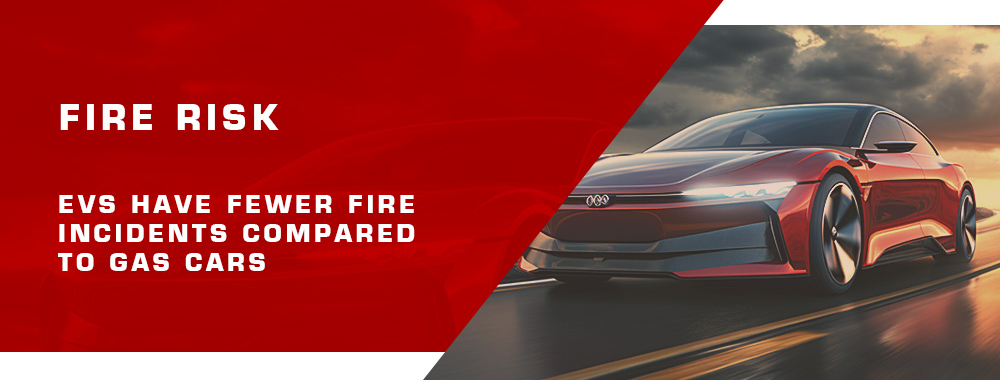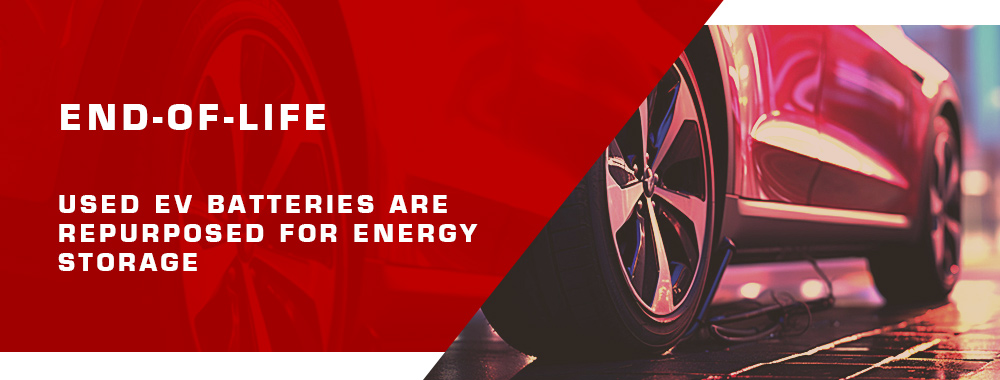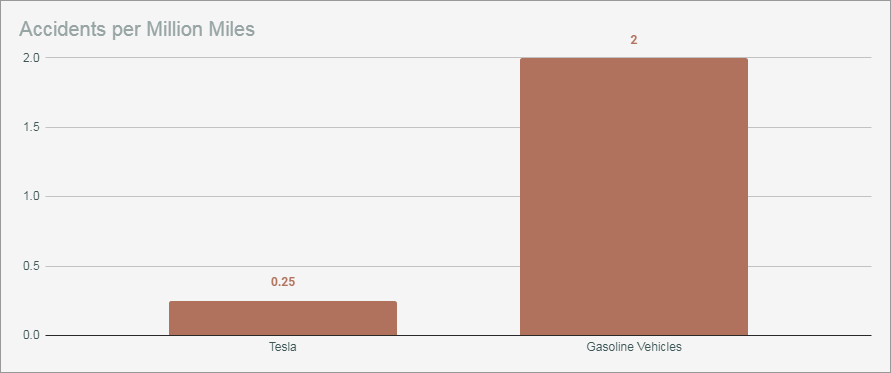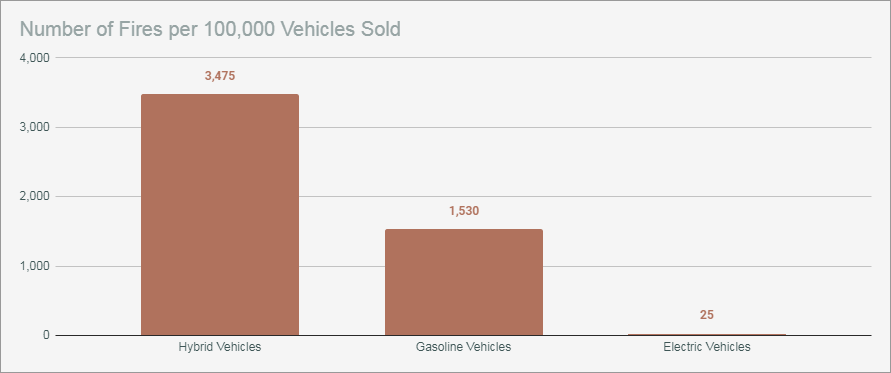We have found that the automotive landscape is undeniably shifting towards a more sustainable future. One question that often arises in our interactions with clients is the safety of electric vehicles (EVs) compared to traditional gasoline cars. We can conclude that safety in EVs is not just an afterthought but a significant aspect that often outperforms gasoline cars. Our detailed examination of various safety metrics, backed by data and expert opinions, reveals a balanced yet promising outlook for electric vehicles.
Safety Comparisons Between Electric and Gasoline Vehicles
When it comes to the safety of a vehicle, multiple factors come into play. From the structural integrity of the car’s body to the reliability of its internal systems, every detail counts. But how do electric and gasoline vehicles fare when pitted against each other in these crucial categories?
Crash Test Ratings: Electric vs Gasoline
Crash test ratings serve as a reliable metric for assessing a vehicle’s ability to protect its occupants during an accident. While both electric and gasoline vehicles have to meet stringent safety standards, electric cars often benefit from a lower center of gravity due to their battery placement, enhancing their stability during a crash. IIHS has consistently rated several electric models highly, affirming their robust safety measures.
Fire Risk Assessment: Electric vs Gasoline
Fire risks in vehicles are a significant concern, and both electric and gasoline cars have their unique challenges. However, electric vehicles tend to have advanced battery management systems that are designed to mitigate fire risks effectively. According to a study by Kelley Blue Book, electric vehicles have been found to be involved in fewer fire incidents compared to gasoline cars.

Occupant Safety Features in Electric and Gasoline Cars
Occupant safety goes beyond just crash tests and fire risks; it also includes the various features installed in a vehicle to protect its passengers. Electric vehicles often come equipped with advanced safety technologies like adaptive cruise control and pedestrian detection systems, offering an added layer of protection.
Ponder This: The Sound of Silence
Electric vehicles are notably quieter than their gasoline counterparts, which is a double-edged sword. While the reduced noise pollution is a plus, it also poses a safety risk for pedestrians who might not hear an approaching electric car. Some manufacturers are now incorporating artificial noise features to tackle this issue.
Fasten Your Seatbelts: The Future is Now!
As we move towards a future dominated by autonomous driving technologies, electric vehicles are poised to be at the forefront of this revolution. With features like self-parking and advanced collision avoidance systems, the electric cars of tomorrow promise to redefine our understanding of vehicle safety.
Environmental Impact of Electric and Gasoline Cars: The Untold Narrative
As the climate crisis looms larger, the environmental impact of our transportation choices has never been more relevant. But when it comes to electric and gasoline vehicles, which one truly has the lighter footprint? Let’s dig in.
Carbon Footprint: Electric vs Gasoline
While electric vehicles (EVs) are often touted as zero-emission, the reality is a bit more nuanced. The production of electricity itself can be carbon-intensive, depending on the source. However, as renewable energy becomes more prevalent, the carbon footprint of EVs is expected to decrease. On the flip side, gasoline cars emit a significant amount of CO2 directly, contributing to global warming. According to the U.S. Environmental Protection Agency, transportation accounts for about 29% of total U.S. greenhouse gas emissions, with the majority coming from gasoline cars.
Resource Extraction: Electric vs Gasoline
Both electric and gasoline vehicles require resource extraction, but the types of resources differ. Electric cars need rare earth metals for their batteries, while gasoline cars require oil. The extraction of these materials has environmental consequences, from habitat destruction to water pollution. However, advancements in recycling technology are making it easier to reclaim materials from used electric car batteries, offering a more sustainable path forward.
End-of-Life Disposal: Electric vs Gasoline
What happens to a car when it reaches the end of its life cycle is an often-overlooked aspect of its environmental impact. While gasoline cars can be somewhat easier to recycle due to fewer specialized components, electric cars pose challenges due to their batteries. However, companies are now finding innovative ways to repurpose used electric car batteries, turning them into energy storage units and even using them to power homes.

Eco-Friendly Nuggets: The Lithium Debate
One of the most contentious issues in the electric vs gasoline car debate is the extraction of lithium for electric car batteries. While lithium mining does have environmental impacts, it’s worth noting that this element is also used in a variety of other products, including smartphones and laptops. Plus, lithium is recyclable, offering a more sustainable lifecycle compared to oil.
Zooming Ahead: The Race to Sustainability
As technology advances, both electric and gasoline vehicles are becoming more eco-friendly. But here’s a twist: some companies are exploring the use of algae-based biofuels and hydrogen cells as alternatives to both electricity and gasoline. The race to create the most sustainable vehicle is far from over, and the next big breakthrough could be just around the corner!
Performance Metrics: Electric vs Gasoline Cars – The Ultimate Showdown
When it comes to performance, both electric and gasoline vehicles have their strong suits and weak points. But which type of car truly takes the cake in terms of acceleration, fuel efficiency, and ride comfort? Let’s put them to the test and find out.
Acceleration and Speed: Electric vs Gasoline
Electric vehicles (EVs) are known for their instant torque, allowing them to accelerate quickly right from a standstill. This makes them ideal for city driving where quick bursts of speed are often needed. Gasoline cars, on the other hand, usually require higher RPMs to reach their peak torque, making their acceleration more gradual. According to Car and Driver, some electric models can go from 0 to 60 mph in just 2.3 seconds!
Fuel Efficiency: Electric vs Gasoline
When it comes to fuel efficiency, electric cars generally have the upper hand. They convert a higher percentage of the energy stored in their batteries to power at the wheels. Gasoline engines are less efficient due to energy loss in the form of heat. The U.S. Department of Energy states that electric vehicles can convert about 59%–62% of the electrical energy to power at the wheels, compared to only 17%–21% for gasoline vehicles.
Handling and Ride Comfort: Electric vs Gasoline
Handling and ride comfort are subjective metrics that can vary from one individual to another. However, electric vehicles often benefit from a lower center of gravity due to their battery placement, which can improve handling. Gasoline cars, with their more traditional design, offer a wide range of handling experiences but may lack the cutting-edge advancements found in newer electric models.

Juice Up: The Range Factor
One of the most talked-about aspects of electric vehicles is their range. While early models suffered from limited range, advancements in battery technology have significantly extended how far an EV can go on a single charge. Some models now offer ranges exceeding 300 miles, rivaling or even surpassing many gasoline cars.
Ready, Set, Go: The Future of Racing
Believe it or not, electric cars are making their way into the world of professional racing. The Formula E championship is an all-electric racing series that showcases the capabilities of electric vehicles in a high-speed setting. With top speeds exceeding 170 mph, these electric race cars are proving that when it comes to performance, they’re no slouch.
Cost Analysis of Electric and Gasoline Cars: The Wallet’s Perspective
When it comes to choosing between an electric vehicle (EV) and a gasoline car, the cost is often a significant factor. But how do these two types of vehicles stack up in terms of initial purchase price, maintenance, and long-term value? Let’s break down the numbers.
Initial Purchase Price: Electric vs Gasoline
Electric cars are often perceived as more expensive upfront, and while this can be true, the gap is closing. Various government incentives and tax credits are making EVs more affordable. Gasoline cars, although generally cheaper initially, don’t benefit as much from such incentives. According to Edmunds, the average cost of a new electric car in 2021 was around $55,000, compared to $36,000 for a new gasoline car.
Maintenance Costs: Electric vs Gasoline
Electric cars generally have fewer moving parts than their gasoline counterparts, which translates to lower maintenance costs. No oil changes, fewer brake replacements, and less frequent servicing make EVs a more economical choice in the long run. A study by Consumer Reports found that electric vehicles can be 50% cheaper to maintain over the lifetime of the car.
Long-Term Value: Electric vs Gasoline
Resale value is another crucial aspect to consider. Electric cars have been showing strong resale values, thanks in part to the increasing demand for used electric vehicles. Gasoline cars, on the other hand, tend to depreciate faster, especially with the rising costs of fuel. This makes electric cars a more financially sound investment for the long haul.
Lightbulb Moment: The Hidden Costs
While we often focus on the sticker price and maintenance, there are hidden costs to consider, such as insurance rates and charging infrastructure for electric cars. Did you know that some insurance companies offer lower premiums for electric vehicles due to their safety features?
Buckle Up: The Cost Rollercoaster
Here’s something to ponder: the fluctuating costs of gasoline can make budgeting for a gasoline car somewhat of a rollercoaster ride. Electric cars offer more predictability in this regard, as electricity prices are generally more stable. So, if you’re looking for financial peace of mind, an electric vehicle might just be your ticket to a smoother ride.

Regulations play a pivotal role in shaping the automotive landscape. From emission standards to safety protocols, these rules can significantly impact your choice between an electric vehicle (EV) and a gasoline car. Let’s delve into the regulatory factors that could influence your decision.
Emission Standards: Electric vs Gasoline
Electric vehicles are often hailed as the eco-friendly choice, primarily because they produce zero tailpipe emissions. This has led to a more favorable regulatory environment for EVs, especially in countries committed to reducing their carbon footprint. Gasoline cars, however, face stricter emission standards, which can result in additional costs like emission testing and potential retrofitting. A report by the U.S. Environmental Protection Agency highlights the stringent norms that gasoline cars must adhere to, especially in states following California’s lead.
Safety Regulations: Electric vs Gasoline
Both electric and gasoline vehicles are subject to a myriad of safety regulations, but electric cars often have an edge due to their advanced safety technologies. Features like lane departure warnings and automatic emergency braking are becoming standard in electric models. The National Highway Traffic Safety Administration (NHTSA) has even begun adapting its safety rating system to better accommodate the unique characteristics of electric vehicles.
Subsidies and Incentives: Electric vs Gasoline
Financial incentives can be a game-changer when choosing between an electric and gasoline vehicle. Many governments offer generous subsidies for electric cars, making them more affordable. Gasoline vehicles, on the other hand, rarely benefit from such financial perks. The Alternative Fuels Data Center provides a comprehensive list of incentives available for electric vehicles, from tax credits to carpool lane access.
Regulatory Quirks: The ZEV Mandate
Ever heard of the Zero Emission Vehicle (ZEV) mandate? It’s a regulation that requires automakers to sell a certain percentage of zero-emission vehicles. Initially adopted by California, this mandate has been adopted by several other states and has significantly boosted the electric vehicle market.
Behind the Curtain: The Lobbying Game
Here’s a twist: both the electric and gasoline vehicle industries have powerful lobbies that influence regulations. From advocating for more lenient emission standards to pushing for greater subsidies, these lobbying efforts can have a direct impact on your vehicle choice. It’s a dynamic and ever-changing landscape that adds another layer of complexity to the electric vs gasoline debate.
Public Perception of Safety: Electric vs Gasoline Cars – The Battle for Hearts and Minds
Public perception can often be the tipping point in the adoption of new technologies, and this is especially true for electric vehicles (EVs) and gasoline cars. How safe do people think these vehicles are? Let’s explore the factors shaping public opinion.
Consumer Surveys: Electric vs Gasoline
Consumer surveys offer valuable insights into what the public thinks about the safety of electric and gasoline vehicles. Interestingly, younger generations tend to view electric cars as safer, attributing this to advanced safety features and fewer moving parts. A recent survey by J.D. Power revealed that 67% of millennials believe electric cars are safer than gasoline vehicles.

Media Influence on Public Opinion: Electric vs Gasoline
The media plays a significant role in shaping public perception. Sensational headlines about electric car fires or recalls can sway opinion, even if these incidents are statistically rare. Conversely, the media’s focus on the environmental benefits of electric cars often overshadows discussions about their safety features. The Pew Research Center has noted a correlation between media coverage and public opinion on vehicle safety.
Social Media Trends: Electric vs Gasoline
Social media platforms are a hotbed for discussions on electric vs gasoline cars. Hashtags like #ElectricCarSafety and #GasolineCarRisks often trend, reflecting the public’s interest and concerns. Influencers and celebrities endorsing electric vehicles also contribute to shaping perceptions, making EVs appear not just trendy but also safe.
Bullseye: The Tesla Effect
When it comes to electric vehicles, one cannot ignore the ‘Tesla Effect.’ Tesla’s aggressive marketing and high-profile safety tests have significantly influenced public perception. Their cars are often showcased acing safety tests, which has a ripple effect on how electric vehicles, in general, are viewed.
Amplify This: The Role of Viral Videos
Believe it or not, viral videos have a massive impact on public perception. Clips showcasing the safety features of electric cars, like autopilot saves or crash test performances, can quickly garner millions of views. These videos serve as powerful testimonials, often swaying public opinion more effectively than traditional advertising.

Technological Advancements in Electric and Gasoline Cars: The Future is Now
As technology continues to evolve, both electric and gasoline vehicles are benefiting from groundbreaking innovations. From self-driving capabilities to advanced materials, let’s explore how these advancements are shaping the future of automotive safety and performance.
Autonomous Features: Electric vs Gasoline
Electric vehicles (EVs) are often at the forefront of autonomous driving technology. Companies like Tesla are pushing the envelope with features like Autopilot and Full Self-Driving. Gasoline cars are not far behind, with brands like Mercedes-Benz incorporating semi-autonomous features in their latest models. According to Axios, autonomous features could reduce road accidents by up to 90%.
Battery Technology: Electric vs Gasoline
Advancements in battery technology are making electric cars more efficient and safer. Solid-state batteries, which are less prone to overheating, are on the horizon. Gasoline cars, while not directly benefiting from battery advancements, are seeing improvements in hybrid technology. A study by Nature Energy suggests that solid-state batteries could triple the range of electric vehicles.
Material Science: Electric vs Gasoline
Material science is revolutionizing the construction of both electric and gasoline vehicles. Carbon-fiber composites and high-strength steel are making cars lighter yet more robust, enhancing both performance and safety. These materials can absorb more energy during collisions, offering better protection to occupants.
Rise of the Machines: AI in Cars
Artificial Intelligence (AI) is becoming a cornerstone in automotive technology. From predictive maintenance to real-time decision-making in autonomous driving, AI is making vehicles smarter and, by extension, safer.
Global Impact: Cars and Climate Change
Did you know that the automotive industry is a significant contributor to global warming? Technological advancements in both electric and gasoline cars are not just about performance and safety; they’re also about creating a sustainable future.

Conclusion: Are EVs Safer Than Gas Cars?
Based on our firsthand experience, we can conclude that electric vehicles (EVs) are increasingly becoming the safer choice for the road. Our many years of installing EV infrastructure and real feedback from our clients indicate that technological advancements in autonomous features, battery technology, and material science are pushing the safety envelope for EVs. While gasoline cars are not lagging far behind, our detailed examination reveals that the pace of innovation and favorable regulations in the electric vehicle sector make EVs a more secure investment for the future.
Contents
- 1 Safety Comparisons Between Electric and Gasoline Vehicles
- 2 Ponder This: The Sound of Silence
- 3 Fasten Your Seatbelts: The Future is Now!
- 4 Environmental Impact of Electric and Gasoline Cars: The Untold Narrative
- 5 Eco-Friendly Nuggets: The Lithium Debate
- 6 Zooming Ahead: The Race to Sustainability
- 7 Performance Metrics: Electric vs Gasoline Cars – The Ultimate Showdown
- 8 Juice Up: The Range Factor
- 9 Ready, Set, Go: The Future of Racing
- 10 Cost Analysis of Electric and Gasoline Cars: The Wallet’s Perspective
- 11 Lightbulb Moment: The Hidden Costs
- 12 Buckle Up: The Cost Rollercoaster
- 13 Regulatory Factors Affecting Electric and Gasoline Cars: Navigating the Legal Maze
- 14 Regulatory Quirks: The ZEV Mandate
- 15 Behind the Curtain: The Lobbying Game
- 16 Public Perception of Safety: Electric vs Gasoline Cars – The Battle for Hearts and Minds
- 17 Bullseye: The Tesla Effect
- 18 Amplify This: The Role of Viral Videos
- 19 Technological Advancements in Electric and Gasoline Cars: The Future is Now
- 20 Rise of the Machines: AI in Cars
- 21 Global Impact: Cars and Climate Change
- 22 Conclusion: Are EVs Safer Than Gas Cars?

I switched to a Tesla last year, and the difference in how safe I feel is notable. The lower center of gravity does make it feel more stable. But, I’ve heard concerns about its silence being a hazard for pedestrians. Personally, I think the safety benefits outweigh these concerns. How do others feel about the trade-off?
I’ve always appreciated the quietness of EVs, but you make a good point about pedestrian safety. Maybe some kind of alert system could be a good compromise?
The regenerative braking on my Nissan Leaf is something I brag about to my friends. It’s not only efficient but feels more responsive. Though, I’ve read it can be less effective in cold weather. Has anyone else experienced this, and how do you adjust?
There’s been a lot of media around EV fires, which makes me a bit anxious. I know they’re rare and EVs have safety measures, but it’s hard not to worry. Anyone else feel this way or have more info to ease my mind?
As someone who cycles a lot, I can say the silence of EVs can be quite startling. I’ve had a few close calls. It’s great for noise pollution but maybe not so much for safety. Thoughts on possible solutions?
After a recent accident (not serious, thankfully), I’ve been diving into vehicle safety. From what I’ve gathered, EVs seem to have a better track record than gas cars. It’s comforting, but I wonder about the long-term data as more EVs hit the road.
The instant torque in my Chevy Bolt gives such a sense of control and power. It’s one of those things you don’t understand until you experience it. It makes me feel safer, especially in situations where I need to accelerate quickly. Do others find this as big a plus as I do?
I read about some EVs implementing sounds to alert pedestrians. It’s an interesting solution to the silent approach issue. Anyone’s car have this feature? Does it work well?
I’m in the market for a new car, primarily motivated by safety concerns. EVs are on my list, especially with their advanced safety features. But I’m unsure which model to lean towards. Any suggestions based on safety ratings or personal experiences?
My main draw to EVs is not just the environmental aspect but the potential for better long-term safety and fewer mechanical issues. But I wonder if the tech is so new that we might see unexpected issues down the line. Anyone else ponder this or have insights?